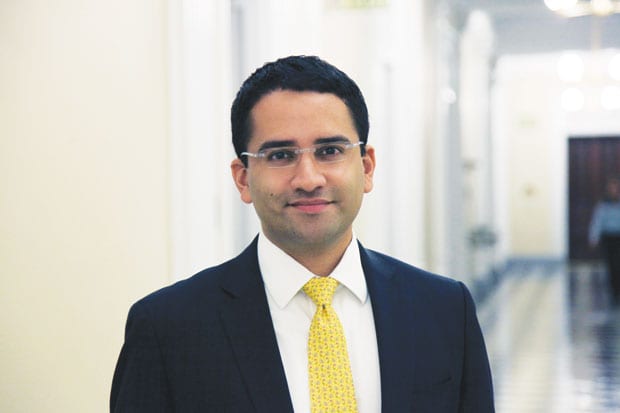Local LGBT organizations join forces with presidential liaison to enroll the community in healthcare before the March 31 signup deadline

ASK THE EXPERTS | White House LGBT liaison Gautam Raghaven will answer questions about the Affordable Care Act when he visits Dallas.
With the March 31 deadline to sign up for healthcare looming, the White House has made signing up Texans a priority because more people in Texas remain uninsured than anywhere else in the country. The LGBT community is among the most underserved groups, so Gautam Raghaven, White House Office of Public Engagement associate director and liaison to the LGBT community, will appear in Dallas on Sunday to make a final push for enrollment.
“The deadline to enroll is coming up quickly — on March 31st — and it is important for all Americans who don’t have health insurance, including LGBT people, to take advantage of new affordable options,” Raghaven said in an email to Dallas Voice. “That’s why we are so glad that Out2Enroll and LGBT organizations in
Dallas are working hard to get the word out.”
Raghaven will be part of an Ask The Experts panel at the Interfaith Peace Chapel discussing the Affordable Care Act and what it means for the LGBT community.
Katie Keith, a consultant working with Out2Enroll, and Kellan Baker of the Center for American Progress also will speak. Out2Enroll was created to connect members of the LGBT community with the new health insurance options available through the Affordable Care Act.
According to statistics provided by Keith, one in three low- or middle-income LGBT people are uninsured. Of those who are uninsured, four out of 10 face medical debt, and 44 percent of all LGBT people put off medical care because they can’t afford it.
The LGBT community is underserved in other ways. Only 44 percent of the general population received medical coverage through their employers compared to 58 percent of the general population. While two-thirds of the LGBT community knows about the healthcare mandate, only a third know about the subsidies and new options available through the online marketplace, according to the Center for American Progress.
Nell Gaither, president of Trans Pride Initiative is an organizer of the event. She said according to census data, the number of persons without health insurance is higher in Texas than in any other state.
“There appears to be increasing interest in getting enrolled as the 2014 deadline approaches, so if we can tap into that interest and provide information that helps more people in the community understand the subsidies available and get enrolled, that would be wonderful,” Gaither said.
Fewer than 300,000 of the 6 million uninsured Texans signed up for coverage by March 1. The open enrollment deadline is March 31. Those who remain uninsured after that date will pay a penalty.
Because Texas didn’t expand Medicaid, those with lower incomes will be disproportionately left without coverage.
“We are afraid that those with lower income levels may have disproportionately avoided enrolling,” Gaither said.
Texas not expanding Medicaid is a problem, but those who earn above the 2014 federal poverty level of $11,670 for a single person should qualify for subsidies that may cover most of the costs.
“Multiple factors of discrimination that include race, ability, gender identity and expression, sexual orientation and economic status can also mean disproportionately lower access to healthcare and a perception that the Affordable Care Act may not offer much assistance,” Gaither said. “That’s not true, so we hope this and other events now taking place can help increase enrollment across these demographics.”
In addition to Trans Pride Initiative, three trans groups — Black Transwomen, Black Transmen and the Transgender Education Network of Texas — are sponsoring the event. Within the LGBT community, the trans community has been excluded from health coverage at even higher rates, but the ACA addresses the community’s needs.
According to Out2Enroll, being transgender is no longer considered a pre-existing condition. Insurance coverage may no longer be based on someone’s gender identity or transgender medical history.
Gay and lesbian couples may find it easier to buy insurance as well.
This month, the Department of Health and Human Services that is overseeing the rollout of the ACA issued new guidance relating to married same-sex couples.
People who are legally married may apply for health coverage together no matter what state they live in. However, that mandate doesn’t apply yet to employer-provided coverage that was already in place.
Keith said access to healthcare isn’t as much of a priority to some members of the LGBT community as marriage equality or employment discrimination. She called health an equality issue.
“The LGBT community faces health disparities in areas like obesity, smoking, cancer screening and HIV,” she said. “And LGBT people are disproportionately likely to be uninsured and to face barriers to quality health care such as poor treatment by health care providers or inequitable policies and practices in health care facilities.”
Gaither hopes a number of people leave the event with first-time health coverage.
“We would especially like to reach out to lower-income persons in the LGBTQ community who may not have previously been provided enough information to make an informed decision about enrollment,” Gaither said.
Navigators will be on hand at the event for free consumer assistance.
Interfaith Peace Chapel, 5910 Cedar Springs Road. March 23. 5–6:30 p.m.
This article appeared in the Dallas Voice print edition March 21, 2014.


